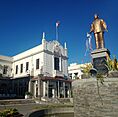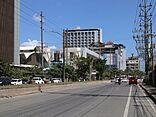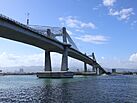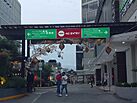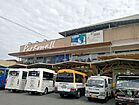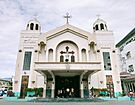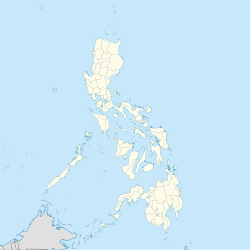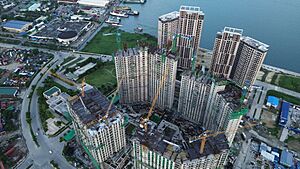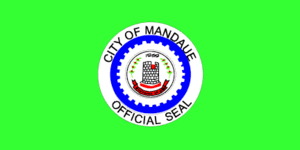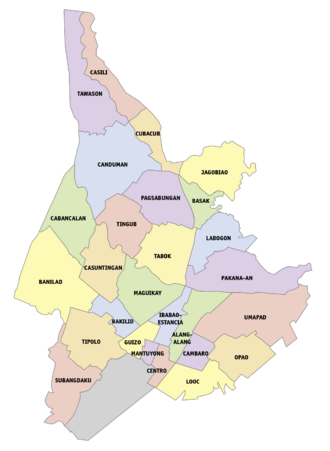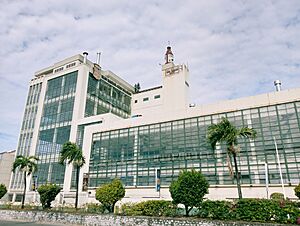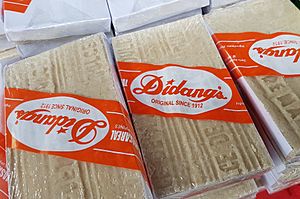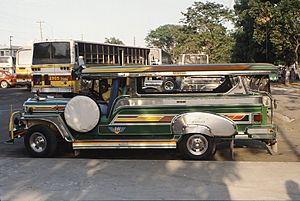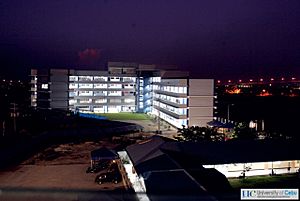Mandaue facts for kids
Quick facts for kids
Mandaue
|
|||
|---|---|---|---|
|
Highly urbanized city
|
|||
|
Mandaue Presidencia
Zuellig Avenue
Marcelo Fernan Bridge
Oakridge Business Park
Parkmall
Mandaue Church
|
|||
|
|||
Nickname(s):
|
|||
| Anthem: Mandaue ang Dakbayan English: Mandaue, the City |
|||
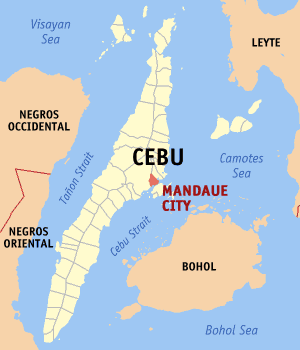
Map of Central Visayas with Mandaue highlighted
|
|||
|
OpenStreetMap
|
|||
| Country | Philippines | ||
| Region | Central Visayas | ||
| Province | Cebu (highly urbanized city participating in the provincial government of Cebu) | ||
| District | [[{{#property:P7938}} | — Lua error in Module:Wd at line 1804: attempt to index field 'wikibase' (a nil value).]] | ||
| Pueblo | circa 1656 | ||
| Municipality Status | 1901 | ||
| Cityhood | August 30, 1969 | ||
| Highly urbanized city | February 15, 1991 | ||
| Barangays | 27 (see Barangays) | ||
| Government
|
|||
| • Type | Sangguniang Panlungsod | ||
| Area | |||
| • Total | 34.87 km2 (13.46 sq mi) | ||
| Elevation | 22 m (72 ft) | ||
| Highest elevation | 984 m (3,228 ft) | ||
| Lowest elevation | 0 m (0 ft) | ||
| Population
(2020 census)
|
|||
| • Total | 364,116 | ||
| • Density | 10,442.1/km2 (27,045/sq mi) | ||
| • Households | 103,345 | ||
| Economy | |||
| • Gross domestic product (GDP) | ₱109.6 billion (2022) $1.936 billion (2022) |
||
| • Income class | 1st city income class | ||
| • Poverty incidence |
|
||
| • Revenue | ₱ 3,544 million (2022) | ||
| • Assets | ₱ 34,231 million (2022) | ||
| • Expenditure | ₱ 3,253 million (2022) | ||
| • Liabilities | ₱ 2,016 million (2022) | ||
| Service provider | |||
| • Electricity | Visayan Electric Company (VECO) | ||
| • Water | Metropolitan Cebu Water District (MCWD) | ||
| Time zone | UTC+8 (PST) | ||
| ZIP code |
6014
|
||
| PSGC |
[https://psa.gov.ph/classification/psgc/?q=psgc/barangays/{{#pro000®code={{&provcode=
|
||
| IDD : area code | +63 (0)32 | ||
| Native languages | Cebuano | ||
| Website | www |
||
Mandaue is a busy city in the Central Visayas region of the Philippines. It is officially called the City of Mandaue. In 2020, about 364,116 people lived there.
Mandaue is located on the central-eastern coast of Cebu island. It is very close to Mactan Island, where Lapu-Lapu City is. Two bridges, the Mactan-Mandaue Bridge and Marcelo Fernan Bridge, connect Mandaue to Mactan Island. To the north, Mandaue borders the town of Consolacion. To the east is the Camotes Sea, and to the west and south is Cebu City.
Mandaue is one of three big cities on Cebu island. It is part of the Cebu Metropolitan area. In April 2019, Mandaue became its own special legislative district. This means it has its own representative in the 19th Congress of the Philippines since June 2022.
Contents
History of Mandaue
A long time ago, a group of Austronesian people built a community in Mandaue. A writer named Antonio Pigafetta wrote about a place called "Mandaui" in the 1500s. It had a leader named Apanoaan.
The Spanish rulers made the people of Mandaue live in a town. This town was first a mission village, managed by Jesuits and later by Recollects. It helped the church in northern Cebu.
In 1898, the Philippine Revolution brought a new way of governing the town. However, American troops soon took over. In 1901, a battle almost destroyed the town, and its leader, Presidente Benito Ceniza, died.
Mandaue became an independent municipality in 1901 under American rule. Before this, it was still under the control of Cebu province. On July 4, 1946, Mandaue became fully independent, along with the rest of the Philippines.
Becoming a City
On August 30, 1969, Mandaue officially became a chartered city. This meant it had its own city government. Later, on February 15, 1991, it was recognized as a highly urbanized city. This gave it even more independence. As mentioned, in April 2019, Mandaue got its own special district for government representation.
Geography and Land Use
Mandaue City covers about 34.87 square kilometers (13.46 sq mi). It is one of the smallest government units in terms of land area. It is the second smallest in the Metro Cebu area.
Most of Mandaue's land is very flat. About 77% of the city has a gentle slope. This includes areas like Centro, Looc, and Tipolo. The main type of soil in Mandaue is Mandaue Clay Loam.
The North Reclamation Project added about 180 hectares (440 acres) of new land. About 36 hectares (89 acres) of this new land belong to Mandaue City.
Climate in Mandaue
| Climate data for Mandaue | |||||||||||||
|---|---|---|---|---|---|---|---|---|---|---|---|---|---|
| Month | Jan | Feb | Mar | Apr | May | Jun | Jul | Aug | Sep | Oct | Nov | Dec | Year |
| Mean daily maximum °C (°F) | 28 (82) |
29 (84) |
30 (86) |
31 (88) |
31 (88) |
30 (86) |
30 (86) |
30 (86) |
30 (86) |
29 (84) |
29 (84) |
28 (82) |
30 (85) |
| Mean daily minimum °C (°F) | 23 (73) |
23 (73) |
23 (73) |
24 (75) |
25 (77) |
25 (77) |
25 (77) |
25 (77) |
25 (77) |
25 (77) |
24 (75) |
23 (73) |
24 (75) |
| Average precipitation mm (inches) | 70 (2.8) |
49 (1.9) |
62 (2.4) |
78 (3.1) |
138 (5.4) |
201 (7.9) |
192 (7.6) |
185 (7.3) |
192 (7.6) |
205 (8.1) |
156 (6.1) |
111 (4.4) |
1,639 (64.6) |
| Average rainy days | 13.4 | 10.6 | 13.1 | 14.5 | 24.2 | 27.9 | 28.4 | 27.7 | 27.1 | 27.4 | 22.5 | 15.9 | 252.7 |
| Source: Meteoblue | |||||||||||||
Barangays: Neighborhoods of Mandaue
Mandaue City is divided into 27 smaller areas called barangays. Each barangay has even smaller parts called puroks and sometimes sitios.
| PSGC | Barangay | Population | ±% p.a. | |||
|---|---|---|---|---|---|---|
| 2010 | ||||||
| 072230001 | Alang-alang | Expression error: Missing operand for /.% | 11,495 | 12,475 | −0.52% | |
| 072230002 | Bakilid | Expression error: Missing operand for /.% | 4,387 | 5,027 | −0.86% | |
| 072230003 | Banilad | Expression error: Missing operand for /.% | 18,386 | 22,297 | −1.21% | |
| 072230004 | Basak | Expression error: Missing operand for /.% | 11,777 | 7,858 | 2.60% | |
| 072230005 | Cabancalan | Expression error: Missing operand for /.% | 14,841 | 12,202 | 1.25% | |
| 072230006 | Cambaro | Expression error: Missing operand for /.% | 8,990 | 8,082 | 0.68% | |
| 072230007 | Canduman | Expression error: Missing operand for /.% | 23,455 | 17,100 | 2.02% | |
| 072230008 | Casili | Expression error: Missing operand for /.% | 5,403 | 3,743 | 2.35% | |
| 072230009 | Casuntingan | Expression error: Missing operand for /.% | 16,846 | 13,217 | 1.55% | |
| 072230010 | Centro (Poblacion) | Expression error: Missing operand for /.% | 2,980 | 3,236 | −0.52% | |
| 072230011 | Cubacub | Expression error: Missing operand for /.% | 13,832 | 8,255 | 3.32% | |
| 072230012 | Guizo | Expression error: Missing operand for /.% | 7,258 | 8,554 | −1.04% | |
| 072230013 | Ibabao-Estancia | Expression error: Missing operand for /.% | 6,994 | 8,641 | −1.33% | |
| 072230014 | Jagobiao | Expression error: Missing operand for /.% | 12,138 | 12,227 | −0.05% | |
| 072230015 | Labogon | Expression error: Missing operand for /.% | 20,466 | 19,175 | 0.41% | |
| 072230016 | Looc | Expression error: Missing operand for /.% | 17,395 | 14,438 | 1.19% | |
| 072230017 | Maguikay | Expression error: Missing operand for /.% | 14,956 | 17,782 | −1.09% | |
| 072230018 | Mantuyong | Expression error: Missing operand for /.% | 5,487 | 5,869 | −0.43% | |
| 072230019 | Opao | Expression error: Missing operand for /.% | 12,014 | 9,907 | 1.23% | |
| 072230020 | Paknaan | Expression error: Missing operand for /.% | 30,532 | 22,957 | 1.82% | |
| 072230021 | Pagsabungan | Expression error: Missing operand for /.% | 20,266 | 16,838 | 1.18% | |
| 072230022 | Subangdaku | Expression error: Missing operand for /.% | 17,097 | 20,333 | −1.09% | |
| 072230023 | Tabok | Expression error: Missing operand for /.% | 19,486 | 15,709 | 1.37% | |
| 072230024 | Tawason | Expression error: Missing operand for /.% | 6,984 | 4,891 | 2.28% | |
| 072230025 | Tingub | Expression error: Missing operand for /.% | 6,082 | 5,780 | 0.32% | |
| 072230026 | Tipolo | Expression error: Missing operand for /.% | 15,790 | 17,273 | −0.57% | |
| 072230027 | Umapad | Expression error: Missing operand for /.% | 18,779 | 17,454 | 0.46% | |
| Total | 331,320 | Expression error: Unexpected < operator.% | ||||
Population and People
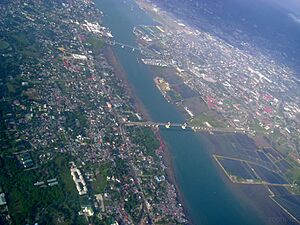
The first records of Mandaue show a population of 160 people in the 1630s. By 1899, when it became a township, Mandaue had 42 barrios and 21,086 people. In 1964, its population was 33,811.
The 2020 census showed that Mandaue had 364,116 people. This was a big increase from the 2000 census. Most people in Mandaue, about 95.2%, are Roman Catholic. Some people in Mandaue live with less money.
Economy and Business
|
||||
Mandaue is known as the "industrial hub" of its region. About 40% of Cebu's companies that export goods are located here. The city has around 10,000 industrial and commercial businesses.
Many big companies have their homes in Mandaue. These include San Miguel Corp., Coca-Cola Bottling Corp., and Monde Nissin. Shemberg, a top exporter of carrageenan (a food additive), is also here. Profood International Corp. and 7D Dried Mangoes are other famous businesses. Mandaue City also makes 75% of the country's furniture exports. This is why it's called the "furniture capital" of the Philippines. Mandaue Foam, a furniture company, started in 1971. It now has 25 factories and showrooms across the country.
Fun Things to See and Do
Mandaue has many interesting places to visit:
- Natural Areas
- Monkey Caves
- Cansaga Bay
- Butuanon River
- Casili Hills
- Jagobiao Spring
- Cabancalan-Banilad Sinkholes
- Mahiga River
- Historical Places
- Bantayan Sa Hari
- National Shrine of Saint Joseph
- Mandaue Presidencia, the City Hall
- Ouano Wharf
- Mandaue Salt Beds
- Eversley Childs Sanitarium
- Rizal-Bonifacio Memorial Library
- Bathan Press
- San Miguel Brewery
- Rainbow Lane
- Cebu International Convention Center
- Museums
- 856 G Gallery
- Luis Cabrera Ancestral House and Museum
- Mandaue City Public Library
- Quijano Museum
- Parks
- City Plaza
- Bridge Park
- Ibabao Mandaue Agri-Eco Park
- Subangdaku Wireless Sports Center
- Cebu Westown Lagoon
- WaterWorld Cebu
- Sports
- Wireless Plaza and Sports Complex
- Mandaue City Sports and Cultural Complex
- Mandaue Tennis Complex
- Portside Badminton Plaza
- Quick Points Badminton Club
- San Roque Football Club
- Sacred Heart–Ateneo de Cebu Sports Complex
- Cebu Golf Academy
- Gorilla Booth Camp
- Shopping and Modern Areas
- Ayala Malls Gatewalk Central (under construction)
- Bridges Town Square
- City Times Square
- Insular Square Mall
- Mandani Bay
- Oakridge Business Park
- Pacific Mall
- Parkmall
- SM J Mall (formerly J Centre Mall)
Festivals and Celebrations
Mandaue Fiesta: This festival is held on May 8. It honors the city's patron saint, Saint Joseph. During this time, there are parades, sports games, and the Miss Mandaue beauty competition. There are also rodeos, street festivals (Mantawi Festival), and fairs.
Panagtagbo sa Mandaue: This is Mandaue's main festival today. It celebrates the Holy Family. It happens every second week of January. This is just before the Traslacion, a religious event of the Sinulog Festival. In the Traslacion, the Santo Niño and the Virgin of Guadalupe visit the shrine of Saint Joseph in Mandaue. The next morning, a boat parade goes back to the Basilica. The festival includes singing, dancing, and street dancing.
Kabayo Festival: The Kabayo (Horse) festival is also called the Governor's Cup. It features horse racing and other horse riding sports. It takes place every year in the second week of February.
Pasigarbo sa Sugbo: This festival shows off Cebu's culture, faith, history, and products from different towns. It is held every year around August 6. It used to be in Mandaue City at the Cebu International Convention Center. However, since 2019, it has been held in Cebu City.
Delicious Food in Mandaue
Mandaue has many restaurants. You can find Italian, Japanese, Indian, and other international foods. There are also many places that serve local Filipino dishes.
Some famous Cebuano foods include lechon, which is roasted pig. It is often eaten with achara, or pickled vegetables. Sugba means barbecue. You can find barbecued fish (isda), pork (baboy), chicken (manok), or beef (baka). These are often eaten with puso, which is rice cooked in woven coconut leaves.
Kinilaw is raw meat, usually pork or fish, mixed with vinegar and salt. Buwad is dried seafood, like fish or squid. It can smell strong but is crunchy and chewy. Some unique dishes include dinuguan, a soup made with pig's blood. Barbecued chicken feet are also popular with locals.
Foods special to Mandaue include bibingka, which are steamed rice cakes with coconut and sometimes egg. Binangos is ground corn with Bolinao fish. This dish is only found in Mandaue. Other local treats are tagaktak, the seasonal buriring fish, and the famous masareal.
Getting Around Mandaue
Mandaue City has a good road system. A national highway connects it to nearby cities and towns. There are also city roads and barangay roads. The city has four bridges.
For getting around on land, people use PUJs, utility vehicles, mini-buses, multi-cabs, tricycles, and trisikads. For moving goods, trailers and vans are used. For sea travel, Mandaue uses the Port of Cebu and Cebu International Port, which are very close by.
The MyBus system is expanding. A new 9.5-kilometer (5.9 mi) road for MyBus started from the boundary of SM City Cebu to SM City J Mall in October 2024. MyBus began operating in City di Mare in 2017.
Learning and Schools
Mandaue is home to two universities: the Cebu Doctors' University and the Lapu-Lapu–Mandaue campus of the University of Cebu. There are also technical schools like TESDA that offer special training. Other private schools provide different types of degrees.
Mandaue has a long history of supporting education. The Cabahug Medal was started in 1923 by Sotero Cabahug. It is given every year for excellent school performance. The Mandaue Fraternal Society was also created in the early 1900s. It helped professionals in the community when Mandaue was a smaller town.
The Cebu Japanese School (CJS) is a part-time Japanese school located in Mandaue City.
Media and Communication
Television and radio stations from Cebu City also serve Mandaue City.
Television Stations
- DYCB-TV (ABS-CBN Cebu) - Channel 3: This station stopped broadcasting after its license was not renewed in May 2020.
- DYKC-TV (RPTV 9) - Channel 9: This is a relay station for the Radio Philippines Network / Nine Media Corporation.
Radio Stations
- DYKC-AM (Radyo Ronda) - 675 kHz: An AM radio station owned by Radio Philippines Network (RPN).
- DYAR-AM (Sonshine Radio) - 765 kHz: This AM radio station stopped broadcasting in December 2023.
- DYAB-AM (Radyo Patrol) - 1512 kHz: This AM station stopped broadcasting in May 2020.
- DYPC-FM - 88.7 MHz: This community FM station stopped broadcasting in 2019.
- DYLS-FM (MOR Philippines) - 97.1 MHz: This commercial FM station stopped broadcasting in May 2020.
Sister Cities
Local Sister Cities
- Bacolod
- Baguio
- Butuan
- Dumaguete
- Iloilo City
- Marikina
International Sister Cities
Images for kids
See also
 In Spanish: Mandaue para niños
In Spanish: Mandaue para niños
 | John T. Biggers |
 | Thomas Blackshear |
 | Mark Bradford |
 | Beverly Buchanan |


